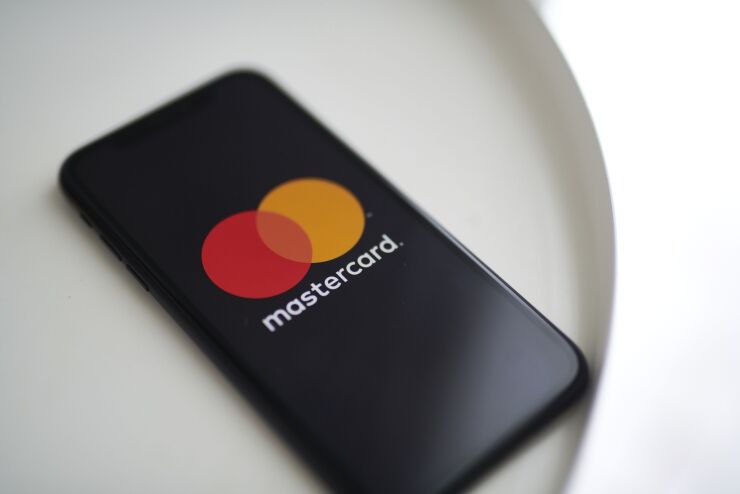
As digital currencies and electronic payment options rapidly proliferate, Mastercard is carving out a role for itself by using its scale and infrastructure to authenticate an expanding variety of financial transactions.
Mastercard this week introduced the Multi Token Network, a venue for other parties to develop digital asset products and validate users for financial institutions, fintechs and central banks. MTN will initially be available in the U.K. in the third quarter and deploy in other markets afterward.
Companies and governments are expanding their use of distributed ledgers such as blockchains to streamline transaction processing. With MTN, the card brand is combining its
"The blockchain can
Blockchains are often associated with cryptocurrency and cryptocurrency trading, though the technology is used for dozens of other financial services tasks, such as security and enabling cross-border payments.
"There is plenty of opportunity in buying and selling tokenized assets," Lambert said. "People think of NFTs as art, but they can also be invoices or carbon credits or titles of ownership. NFTs can also go into trade finance, supply chains, insurance or capital markets."
MTN will address several payment needs tied to blockchains and digital assets. It will support "counterparty trust" by using the Mastercard Crypto Credential, which is a set of common verification standards that parties can use to support transactions on blockchain networks. Early users of the crypto credential include the Australian government, which is running a central bank digital currency pilot.
As part of its overall blockchain strategy, Mastercard is part of an industry initiative called RLN, which aims to build support for the deposit tokenization and associated policy and approaches. MTN can help realize such concepts. MTN will work within RLN, enabling tokens — which are created as substitutes for card account numbers — to power financial applications.
MTN will additionally address scalability and interoperability of blockchain networks through the card brand's tokenization service. It will also create a framework for consumer privacy and regulatory compliance. The initial use case for MTN will be tokenizing bank deposits in the U.K. to support decentralized finance and other applications.
"The approach is like an app store," Lambert said. "There's a framework to develop apps and tools for digital assets. We're not the ones that will develop the apps, we'll provide a venue for that."
One of Mastercard's larger goals is to diversify its business model beyond card payment processing. To that end, it aims to demystify blockchains and digital assets to boost mainstream adoption. Research from
Mastercard in late 2022 connected
"For any financial activity you need a payment. MTN provides the tools and the blocks to onboard payments or money into the blockchain," Lambert said.
Visa operates
What Mastercard is doing is an important step in the evolution of tokenization and digital assets, according to James Wester, co-head of payments research for Javelin Strategy & Research.
"A lot of the early interest in blockchain skipped the hard parts of building tools to make the technology practical and useful," Wester said. "And it's notable that a payment network like Mastercard is spearheading this as its continuing work with crypto, digital assets, tokenization and blockchain is a clear indication they see the potential of the technology for payments and financial services."
There is also an opportunity for Mastercard to expand transaction verification beyond blockchain and cryptocurrency through MTN.
"Asserting that Mastercard is in the payments business is akin to claiming a railroad is in the railroad business, when it's actually in the transportation business," said Richard Crone, a payments consultant. "Likewise, Mastercard operates in the authentication business."
Mastercard and other payment networks provide positive validation for transactions, ensuring payment integrity among stakeholders, Crone said, adding that Mastercard's MTN can counter
"The multi-tokens in MTN are paramount for securing and protecting card-on-file, subscription payments and the digital wallets used by fintechs," Crone said. "That said, blockchain serves as a foundational element in carrying more than just payments on the Mastercard network. It broadens its role as a clearinghouse for all transaction data."






